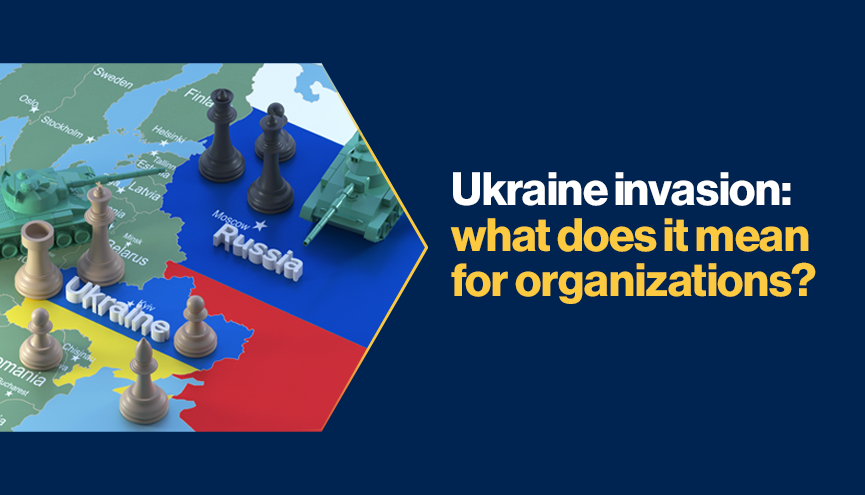Ukraine invasion: what does it mean for organizations?

As Russia continues to move further with the invasion of Ukraine, world leaders fear another large-scale conflict in Europe. What should organizations expect in the coming weeks and months? What are the biggest risks and threats? This article analyses potential outcomes should the situation in Ukraine escalate to a war.
Impacts on the Economy
Europe largely depends on Russia for its gas and oil supply, if the Ukrainian conflict escalates and both sides strengthen their sanctions, Russia could potentially start withholding the supply of gas and oil, or alternatively the west could cut off Russia’s main income stream. Needless to say that this will cause a domino effect on civilians and organizations across the region.
Wheat production and supply is also at risk. Russia and Ukraine together, supply more than one-quarter of the world’s wheat exports. Wheat an essential product for global food industries and any disruption, even the smallest, to its supply can have a large effect on prices. Experts are predicting that the short term, the Western sanctions on Russia “could result in a lot of already harvested grain staying in Russia, and military actions could disrupt trade routes on the Black Sea’. In the long term, a wider invasion of Ukraine could do a lot of damage to that country’s agriculture sector, according to Per Hong, a partner at the Kearney consulting firm.”[1]
The international response to the crisis has so far been to impose economic sanctions on Russian banks and high net-worth individuals. In addition, Germany has put the final approval of the £8.4bn Nord Stream 2 gas pipeline project on hold. The construction of the pipeline between Germany and Russia had been completed and was an important step for Russia to increase its gas supplies to Europe. However, there were already concerns about increasing Europe’s reliance on Russian gas (Germany already imports 35% of its gas requirement from the country), with these concerns now seemingly founded.
With regards to oil prices, on Thursday the Brent price reached the highest level since August 2014. “This growing uncertainty during a time when the oil market is already tight does leave it vulnerable, and so prices are likely to remain volatile and elevated,” said Warren Patterson, head of ING’s commodity research, to Reuters.
Impacts on Organizations based in Ukraine
Local organizations and international companies with staff based in Ukraine are facing risks and threats of different nature – from infrastructure & operations disruption, staff safety, to cyber security and major financial impacts following the sanctions imposed by Wester countries and the rise in price for commodities.
Disruption to critical infrastructure and communications has started; sources with personnel on the ground report limited mobile network availability, which means those trying to establish contact with staff in the region might have trouble doing so in the upcoming hours or days. Mobility is also heavily limited, as the exodus from the areas under attack is causing intense traffic. At the same time, the both sides have been targeting bridges and roads to hinder transportation – including closing down airports.
Since last week, many foreign companies based in Ukraine have started activating contingency plans in fear of a full on Russian invasion of the country – the biggest one being Derevyanko, an association of businesses which includes Nestlé, BASF, ArcelorMittal, Bayer and over 1,000 European firms that employ more than two million people in Ukraine. The American Chamber of Commerce in Ukraine, which includes 633 members (including Toyota and Citibank) admitted that although they kept their operations going they were activating their emergency plans.
On 24th February, as Russia started bombing some areas of Ukraine, several multinational corporations (including world’s largest brewer Carlsberg) closed down their operations and removed their staff from the territory. Hamburger Hafen und Logistik managed to evacuated the the last of their 480 employees at its terminal port in Odessa after seeing Russian cargo entering the territory[2].
In various statements, other companies have admitted of slowing down their production. One of them being the biggest productor of steel mill in Europe, ArcelorMittal, which employed thousands of people in Ukraine. Other companies based in Ukraine are Airbus and Exxon Mobil, which were in standby waiting for how the upcoming Western sanctions against Russia would impact the their business.
Cyber Security and Tech Companies
Aside from the effects on the global supply chain, there is a growing fear about which form a potential Russian retaliation to the sanctions could take, with cyber-attacks one such option. Ukraine has already reported several cyber-attacks of considerable scale this week, with banks and government websites targeted. Ms. Derevyanko said that European and American companies in Ukraine see cyber-attacks as one of the major threats they must deal with as a result of the Russian invasion.
Media outlets are now reporting that Russia is conducting a series of cyber-attacks in Ukraine. This week, Mykhailo Fedorov, Ukraine’s minister of digital transformation, denounced that several banking websites went offline as a result of a DDoS attack[3]. There were also further reports of a “data-wiping” software found circulating on hundreds of computers in Ukraine
Experts agree that cyber-attacks are a form of modern warfare as well as and a fast and ‘cheap’ solution to cause large scale disruption – even a state level. The power of cyber attacks is detrimental and protection and defence against them is costly and difficult – this is why they represent a major threat.
The threat of cyber-attacks extends beyond Ukraine, governments across the world are encouraging organizations to prepare for potential cyber-attacks as a result of current events. Controlling cyber attacks to a defined geographical area is impossible in todays inter-connected world, so even if Russian cyber attacks start in Ukraine they will quickly spread to it neighbours and the rest of the world.
Major Ukraine tech companies are invoking their business continuity plans. Kulraj Smagh, CEO of software development company Ciklum, said the they had a "well-defined business continuity plan designed to protect our associates and our ability to perform work for our clients in various scenarios that may disrupt our business." According to the company, the plan includes moving employees to safer locations, creating redundancy of their critical infrastructure, data backup and redundancy of essential services.
The ongoing invasion of Ukraine will have a terrible impact on Ukrainian tech companies and start-ups, which have been at the heart of the country’s economic growth over the past few years. Some of these include Ajax, Grammarly, Reface; Petcube; People AI, Preply and many more.
What’s next?
The upcoming days and weeks will determine the nature and scale of the conflict. Organizations based in Ukraine will be faced with physical and cyber threats, as well as major disruption to their operations. In Ukraine, the physical threat is imminent, with organizations starting to close down and people fleeing the country. However, it is reassuring to see that large to small companies across the country are making employees and staff safety their top priority.
On the other hand, organizations based in Russia will most likely face the impact of the growing sanctions of Western countries against Russia. We are entering a new era where there will be large changes to international relations, growing security threats, and disruptions to the global market.
[1] https://www.marketplace.org/2022/02/22/ukraine-conflict-could-push-grain-prices-higher-worldwide/









































